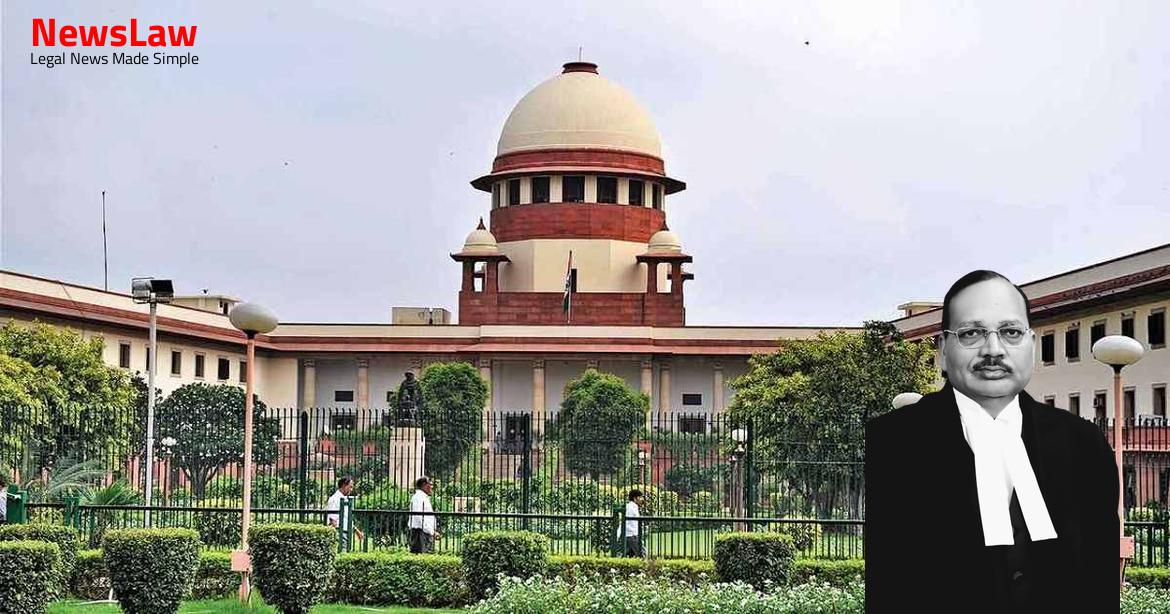1 herein and has set aside the order passed by the lower Appellate Court and has restored the order passed by the Executing Court with respect to the property in question, the original respondent No 1 – objector before the Executing Court has preferred the present appeal. The appellant herein – original respondent No 1 filed objection before the Executing Court, contending, inter-alia, that the property was purchased by him from judgment debtor on 31.08.1999 and that they are in possession of the said land. By the impugned judgment and order the High Court has allowed the said writ petition and has set aside the order passed by the lower Appellate Court by observing that the appellant herein – original respondent No 1 has failed to plead and establish the nature of irregularity or fraud committed in sale and therefore, no fault can be found in the order of the Executing Court.
Shri Ravindra Shrivastava, learned Senior Advocate appearing on behalf of the appellant has vehemently submitted that in the facts and circumstances of the case the High Court has committed a serious error in allowing the writ petition and quashing and setting aside the well- reasoned order passed by the lower Appellate Court.
It is submitted that in the present case balance 75% of the sale consideration was deposited by the auction purchaser on 04.11.2011. It is submitted that therefore the High Court has committed a very serious error in observing that the appellant purchased the property despite the injunction granted by the Trial Court on 18.05.1999 and that the appellant cannot be permitted to raise the objection as the appellant has purchased the property despite the injunction. 1
It is submitted by learned counsel appearing on behalf of respondent
No 1 that in the facts and circumstances of the case no error has been committed by the High Court in restoring the order passed by the learned Executing Court and overruling the objections raised by the appellant herein – objector. It is submitted that therefore, the High Court has rightly observed that since, in the civil suit a temporary injunction was granted by the Trial Court on 18.05.1999 and by that time the property was not purchased by the appellant herein there was no question of putting the appellant to notice. The learned Trial Court also directed that if the defendants transfer their firm Ginni Enterprises to any other person then they would not transfer the same against the interest of the plaintiff. 3 While considering the issue involved in the present appeal with respect to non-compliance of the relevant provisions of CPC, the relevant provisions of the CPC are required to be referred to, namely, Order 21 Rules 64, 84, 85 and 86, which read as under: – “Order 21 – Execution of Decrees and Orders Rule 64.
— (1) On every sale of immovable property the person declared to be the purchaser shall pay immediately after such declaration a deposit of twenty-five per cent on the amount of his purchase-money to the officer or other person conducting the sale, and in default of such deposit, the property shall forthwith be re – sold. — In default of payment within the period mentioned in the last preceding rule, the deposit may, if the Court thinks fit, after defraying the expenses of the sale, be forfeited to the Government, and the property shall be re-sold, and the defaulting purchaser shall forfeit all claim to the property or to any part of the sum for which it may subsequently be sold.”
Also Read: https://newslaw.in/case-type/civil/acquisition-of-land-and-deemed-lapse-under-the-act-2013/
4 As per Order 21 Rule 84, on every sale of immovable property the person declared to be the purchaser shall pay immediately after such declaration deposit of twenty-five per cent on the amount of his purchase-money and in default of such deposit, the property shall forthwith be re- sold. Thus, as per the aforesaid provisions, the purchaser has to deposit 25% of the sale amount immediately on declaring to be the purchaser and the full amount of the purchase-money shall have to be paid by the purchaser into the Court before the Court closes on fifteenth day from the sale of the property. 1 In the case of Manilal Mohanlal
Shah (supra), it is observed and held that the provision regarding the deposit of 25% of the amount by the purchaser other than the decree-holder is mandatory and the full amount of the purchase money must be paid within fifteen days from the date of the sale. In the said decision, this Court considered paragraph 11 of the decision in the case of Manilal Mohanlal
Shah (supra) in paragraph 20 as under: – “20.
Having examined the language of the relevant rules and the judicial decisions bearing upon the subject we are of opinion that the provisions of the rules requiring the deposit of 25 per cent of the purchase money immediately, on the person being declared as a purchaser and the payment of the balance within 15 days of the sale are mandatory and upon non-compliance with these provisions there is no sale at all.
Also Read: https://newslaw.in/case-type/civil/taxation-of-engineering-design-drawings-goods-or-services/
We hold, therefore, that in the circumstances of the present case there was no sale and the purchasers acquired no rights at all.” 3 Applying the law laid down by this Court in the aforesaid decisions to the facts of the case on hand, it is evident that there is non-compliance of mandatory provisions of Order 21 Rule 84 and Order 21 Rule 85 and therefore, the sale was vitiated. Therefore, at the time when the property in question was put to auction on 18.10.2011 the appellant had already purchased the said property as far as back on 31.08.1999 as there was no injunction with respect to the said property while ad-interim injunction dated 18.05.1999 and as observed hereinabove, the property in question was not the subject matter of suit and the decree came to be passed on 30.09.1999 and the property was put to auction in the year 2011 for recovery of sum of Rs.
Under the circumstances, learned Executing Court erred in overruling the objections raised by the appellant against the auction/sale of the property which the appellant purchased much prior to the date of the auction i.e., on 31.08.1999. SHAH)…………………………………J.
Case Title: GAS POINT PETROLEUM INDIA LIMITED Vs. RAJENDRA MAROTHI (2023 INSC 119)
Case Number: C.A. No.-000619-000619 / 2023



